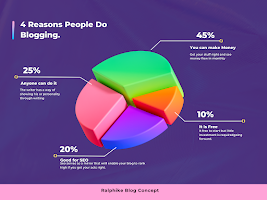A Comprehensive Guide to Starting a Profitable Blog in 2023
Introduction:
Welcome to our comprehensive guide to starting a profitable blog in 2023. Whether you're a beginner or a seasoned blogger, embarking on this journey can be a fulfilling and financially rewarding experience, opening doors to numerous opportunities. By positioning yourself as an authority in your niche, generating a steady stream of income, and connecting with like-minded individuals, you can create a blog that makes a significant impact. In this guide, we'll take you through the step-by-step process of starting a blog and monetizing it, regardless of your skill level. Let's dive right in.
What Is a Blog?
During the early days of the internet, blogs primarily served as online diaries, documenting personal perspectives and experiences. However, over time, blogging has evolved into a versatile tool with various purposes beyond record-keeping. Today, businesses and individuals leverage blogs to disseminate valuable information, drive sales, establish authority in their industries, and more.
Major Points to Consider:
i. Choose a blogging platform: Select a platform that suits your needs and preferences, such as WordPress, Wix, or Blogger. Consider factors like customization options, ease of use, and scalability.
ii. Pick a hosting platform: Find a reliable hosting provider that offers good performance, security, and customer support. Compare different hosting plans and choose one that aligns with your budget and requirements.
iii. Find the right profitable blog niche: Identify a niche that you are passionate about and has potential for monetization. Research market trends, competition, and audience demand to ensure there is an audience for your chosen niche.
iv. Select a blog name and domain: Come up with a catchy and memorable name for your blog that reflects your niche. Register a domain name that matches or closely relates to your blog's name. Consider using domain registrars like GoDaddy or Namecheap. Getresponse is highly recommended
v. Set up and design your blog: Install your chosen blogging platform, customize the design, and optimize it for user experience. Choose a visually appealing theme or template that aligns with your blog's niche and branding.
vi. Brainstorm blog topics: Generate a list of potential blog topics within your niche. Research keywords and popular trends to identify topics that are likely to attract your target audience. Aim for a mix of informative, engaging, and shareable content.
vii. Write your first blog post: Start creating high-quality, well-researched content that provides value to your readers. Develop a consistent posting schedule to keep your audience engaged and coming back for more.
viii. Monetize your blog: Explore different monetization strategies, such as display advertising, sponsored content, affiliate marketing, selling digital products or services, or offering online courses. Experiment with different revenue streams to find what works best for your blog.
ix. Promote your blog: Develop a promotion strategy to increase your blog's visibility and attract a larger audience. Utilize social media platforms, email marketing, SEO techniques, guest posting, and collaborations with other bloggers to expand your reach.
x. Analyze and optimize: Regularly track your blog's performance using tools like Google Analytics. Analyze key metrics such as traffic, engagement, and conversions to identify areas for improvement. Continuously optimize your content and marketing strategies based on the insights gained.
Reasons to Start a Blog:
1. Share Your Expertise: The term "blog" originated from "weblog," which described the online documentation of events and happenings. Blogs are now utilized for a wide range of purposes beyond mere documentation. Creating a blog provides you with a centralized location to store and organize your thoughts, ideas, and photographs. It allows you to showcase your knowledge and expertise in a particular field or industry, making it an ideal platform for personal expression and reflection.
2. Connect with Others: Blogging offers a powerful platform to connect with a diverse range of individuals, including fellow bloggers, content creators, and your intended audience. Through blogging, you can reach out to people from all over the world and build meaningful relationships. By sharing your ideas, experiences, and knowledge, you can attract a like-minded community and foster engagement with your readers. Blogging can open doors to collaboration, networking, and partnerships that you may not have encountered otherwise. Ultimately, the connections you make through blogging can help you grow both personally and professionally.
3. Build Your Personal Brand: Your blog content can serve as a powerful tool for demonstrating your knowledge and expertise in specific subjects. By consistently producing high-quality content on a particular topic or industry, you can position yourself as a credible authority in your field. Through your blog, you can share your insights, experiences, and perspectives, showcasing your unique viewpoint and knowledge. By providing value to your readers, you can build trust and credibility, ultimately attracting a loyal following. Moreover, your blog can serve as a portfolio or showcase of your skills and expertise, making it an effective tool for career advancement and business growth. By consistently producing quality content, you can establish your reputation as an expert, opening doors to new opportunities and partnerships.
4. Earn Money: Blogging can be a profitable venture, whether you're monetizing through ads, sponsorships, affiliate marketing, or selling your own products/services. With strategic implementation and dedication, your blog can become a reliable source of income.
5. Develop New Skills: Blogging provides opportunities to hone various skills such as writing, content creation, and digital marketing. As you immerse yourself in the blogging process, you'll gain valuable expertise in these areas.
6. Leave a Lasting Impact: Your blog can serve as a lasting legacy, sharing your ideas and thoughts with the world for years to come. By creating valuable and engaging content, you can contribute to the online community and make a meaningful impact on your readers.
2. Connect with Others: Blogging offers a powerful platform to connect with a diverse range of individuals, including fellow bloggers, content creators, and your intended audience. Through blogging, you can reach out to people from all over the world and build meaningful relationships. By sharing your ideas, experiences, and knowledge, you can attract a like-minded community and foster engagement with your readers. Blogging can open doors to collaboration, networking, and partnerships that you may not have encountered otherwise. Ultimately, the connections you make through blogging can help you grow both personally and professionally.
3. Build Your Personal Brand: Your blog content can serve as a powerful tool for demonstrating your knowledge and expertise in specific subjects. By consistently producing high-quality content on a particular topic or industry, you can position yourself as a credible authority in your field. Through your blog, you can share your insights, experiences, and perspectives, showcasing your unique viewpoint and knowledge. By providing value to your readers, you can build trust and credibility, ultimately attracting a loyal following. Moreover, your blog can serve as a portfolio or showcase of your skills and expertise, making it an effective tool for career advancement and business growth. By consistently producing quality content, you can establish your reputation as an expert, opening doors to new opportunities and partnerships.
4. Earn Money: Blogging can be a profitable venture, whether you're monetizing through ads, sponsorships, affiliate marketing, or selling your own products/services. With strategic implementation and dedication, your blog can become a reliable source of income.
5. Develop New Skills: Blogging provides opportunities to hone various skills such as writing, content creation, and digital marketing. As you immerse yourself in the blogging process, you'll gain valuable expertise in these areas.
6. Leave a Lasting Impact: Your blog can serve as a lasting legacy, sharing your ideas and thoughts with the world for years to come. By creating valuable and engaging content, you can contribute to the online community and make a meaningful impact on your readers.
Dispelling Misconceptions About Blogs:
Despite prevailing misconceptions, blogs continue to play a crucial role in sharing information, building a following, and establishing an online presence.
Let's address a few misconceptions:
a) To serve a wide range of purposes. They can be used for business promotion, educational resources, news dissemination, entertainment, and much more. Blogs have become a versatile medium for sharing valuable content and engaging with diverse audiences.
b) Blogging Is Easy: While creating a blog may seem straightforward, producing high-quality content that resonates with your target audience requires time, effort, and dedication. Successful blogging demands a consistent commitment to delivering valuable and well-crafted content.
c) Blogs Are Dead: Despite the rise of social media and other digital platforms, blogs continue to thrive as a powerful tool for information sharing and audience engagement. They remain a vital source of valuable information and entertainment for millions of readers worldwide.
d) Blogging Is Not Profitable: While not all blogs generate substantial income, many bloggers earn a significant and sustainable income through various monetization strategies. Advertising, sponsorships, affiliate marketing, and product sales are just a few avenues for turning your blog into a profitable venture.
By debunking these misconceptions, it becomes evident that blogging remains a viable and effective tool for personal and professional growth, online engagement, and income generation.
We hope this guide has inspired you to embark on your blogging journey. With determination, consistency, and a passion for your chosen niche, you can start a blog that not only brings you personal fulfillment but also opens up exciting opportunities for success.
In conclusion, creating a successful blog requires a combination of skills, including writing, SEO, and design.
Follow the tips and strategies provided in this article to improve your writing skills, optimize your blog for SEO, and create visually appealing content. Remember to write compelling content that provides value to your readers and engages them, and to interact and engage with your audience to establish a long-term relationship. By continuously learning and experimenting with new strategies, you can create a successful blog that makes a significant impact in your niche.
Keep exploring Ralphike blog for more informative posts and valuable insights. It's a wrap for now. Did i miss anything? Now i'd like to hear from you.




0 Comments